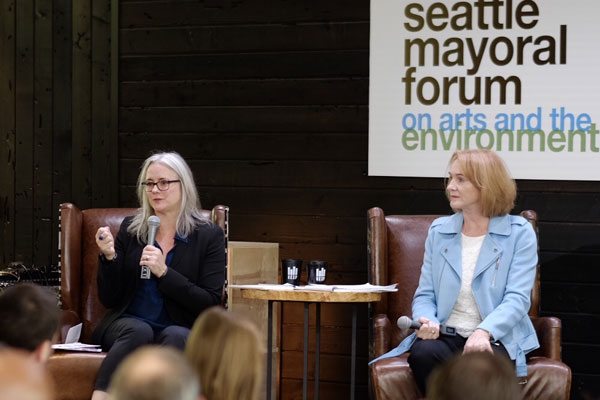
October 18, 2017; Seattle Times
With nonprofits promoting increased civic engagement among their members and the public, the prospect of Amazon’s civic engagement in the Seattle mayoral race must raise some eyebrows.
This week, it was revealed that the marketing behemoth was a contributor to a political action committee (PAC) supporting Jenny Durkan against Cary Moon in the race for the Seattle mayor’s office. The article, “Seattle mayor’s race picks up $590K in late-money surge,” reveals how ten big name corporations, including Comcast, the Washington Association of Realtors, AT&T, Expedia, Starbucks, and Boeing donated at least $10,000 each to the Civic Alliance for a Sound Economy (CASE), which is the political action arm of the Seattle Metropolitan Chamber of Commerce. The Seattle Times calls out Amazon in particular for “adding $100,000 on October 12th to the $250,000 it gave in July.”
In the Times article, a spokesperson for the Moon campaign suggests that some of the companies supporting the CASE PAC have in the past opposed taxes on the incomes of wealthy households, increasing minimum wages for workers, and the creation of a publicly owned broadband service for Seattle. In response to the CASE PAC, Moon has vowed to use her inherited resources to maintain her campaign.
What can a nonprofit with a mission of civic engagement to do in the face of massive campaign spending in a local election by national corporations? For years, community-based organizations have followed Saul Alinsky’s first rule: “Power is derived from two main sources—money and people. ‘Have-Nots’ must build power from flesh and blood.” In many cities, business interests have figured out that huge amounts of money in a local election can scare off the best opponents, co-opt the grassroots, and dominate the messaging. The result is a crisis of civic engagement that looks like voter apathy, but is actually voter disengagement.
Expecting nonprofits to use high school civics techniques of voter registration, education, and mobilization to overcome voter self-suppression is so 19th Century! Nonprofit engagement today needs some new tools to be heard over the din of pervasive paid advertising. One option for nonprofits is to join the political process by drafting an ordinance and lobbying. Other civic engagement efforts include adapting social media tools or forming a 501(c)(4) subsidiary.
Sign up for our free newsletters
Subscribe to NPQ's newsletters to have our top stories delivered directly to your inbox.
By signing up, you agree to our privacy policy and terms of use, and to receive messages from NPQ and our partners.
Last year, NPQ’s Austin Belali explored the role of civic engagement funders in “Is Democracy Funding Undemocratic? Funding Civic Engagement in an Era of Protest.” A key takeaway from his article is the idea that civic engagement funders have been slow to recognize and support the emergence of a new generation of civic activists.
Rather than funding the capacity of trusted, local community-based organizations, a disproportionate amount of grantmaking dollars flows to short-term voter registration and mobilization efforts.
Finding new ways to support marginalized communities is one key to building a base for civic activism, but another critical factor is shaping engagement messages that have a direct, tangible payoff for the disaffected voters.
The city or region that wins the Amazon HQ2 competition may be getting a bonus in the form of a perpetual funding machine for the political interests of business. Earlier this month, an NPQ article contrasted a city with strong civic engagement (Pittsburgh) with a nearby city that lacks a civic base (Cleveland). What’s clear now from Amazon’s investment in Seattle’s mayoral race is that efforts to balance grassroots and corporate engagement will be more crucial to the long-term success of the whole community. A municipality or region that’s willing to offer massive incentives to lure a national corporation could find itself the perpetual servant of that corporation’s interests: “Would you like a new highway to your factory? How about eminent domain to tear down some affordable housing to make room for a warehouse?” Or maybe the corporation’s social control is subtler, like an “old-boys” agreement with local officials to slow-walk enforcement of public health and safety regulations.
Clearly, the community that wins the Amazon HQ2 lottery will benefit from corporate donations to “feel-good” charities. But it’s worth being skeptical about Amazon’s commitment to investing in the kind of community-building that will, in the words of Austin Belali, support “funding aimed at building the core civic engagement capacities of social justice organizations.” For Amazon, being a good corporate citizen includes supporting grassroots civic engagement.—Spencer Wells













